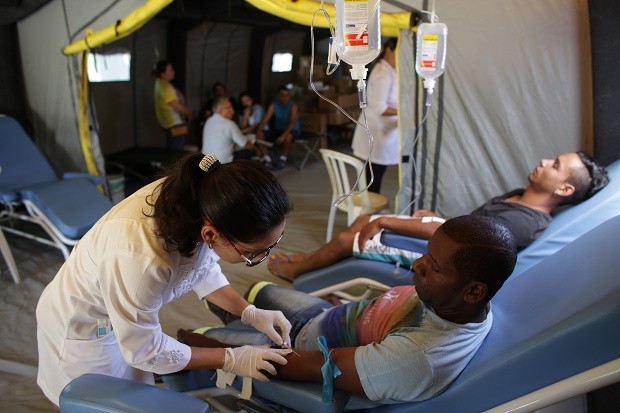
Patients receive treatment at a medical mobile unit in the Brazlandia neighborhood of Brasilia, Brazil, Wednesday, Feb. 17, 2016. The medical unit is in place to attend those who have been affected by diseases transmitted by the Aedes aegypti mosquito, like dengue, malaria and Zika. There is mounting evidence, mainly out of Brazil, after last year’s mosquito-borne Zika outbreaks, of dramatic increases of microcephaly cases in newborn children and of a paralyzing condition called Guillain-Barre syndrome in adults. AP
BOGOTA, Colombia — The spread of Zika will have a modest drag on economies in Latin America, with tourism-dependent Caribbean nations most at risk, the World Bank said Thursday. It made $150 million immediately available to help fight the virus.
The World Health Organization has declared a global health emergency in response to the Zika outbreak and the U.S. is urging pregnant women to avoid travel to the 26 nations and territories in the Americas where Zika is present because researchers have identified possible links between the virus and rare birth defects.
But despite the scare, the World Bank says the impact from the epidemic is likely to be small.
In a report, it estimates lost revenue will total only $3.6 billion, or about 0.6 percent of the region’s gross domestic product. That would come from reduced travel to the region and sick employees missing work, while anti-mosquito efforts will strain already tight national budgets.
For smaller island-states, the impact could reach as high as 1.6 percent of GDP, the bank said. The Bahamas, Barbados and Antigua and Barbuda are among the nations most at risk, it said.
The forecast assumes the regional and international response to the virus is swift and well-coordinated.
“Our analysis underscores the importance of urgent action to halt the spread of the Zika virus and to protect the health and well-being of people in the affected countries,” Jim Yong Kim, president of the Washington-based World Bank, said in a statement.
While a number of countries have reported a rash of business conference and wedding cancellations, hotels were booked full and the mood as festive as ever during this month’s Carnival celebration in Brazil, the epicenter of the epidemic. In Rio de Janeiro, average hotel occupancy was 86 percent during the festivities, an increase of almost three percentage points over the previous year, according to the Brazilian Hoteliers’ Association.
READ: Bleisure: Zika casts a pall on some company getaways
Caribbean nations are similarly unfazed about economic losses, with officials on Tuesday forecasting that tourist arrivals to the region would increase about 5 percent this year from nearly 29 million visitors in 2015.
Kim, who in 2014 harshly criticized the world’s response to West Africa’s Ebola outbreak, said additional support for anti-Zika efforts is available if countries need it. The $150 million funding available now is based on current country demands for financing and follows consultations with several governments across the region.